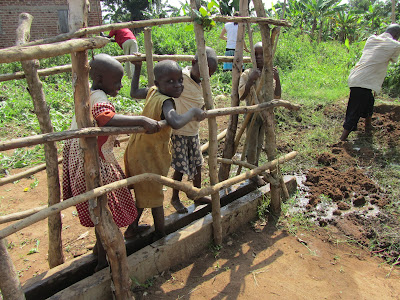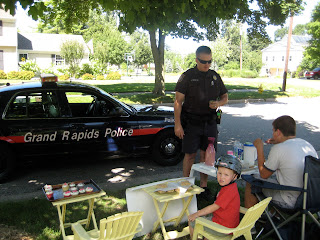Cak Kirk interned with UVP in 2011 and served as a team leader in Nakamini village. She has a Master of Public Health from the University of Michigan and now works at the Sexuality and Health Lab at UMSPH.
Uganda Village Project (UVP): Tell us a bit about yourself.
Cat Kirk (CK): I just graduated in April from the University of Michigan with my Master of Public Health. In addition to enjoying my post-graduate school free time, I am currently working at the Sexuality and Health Lab at the University of Michigan School of Public Health. At the Sexuality and Health Lab, I work on several mixed methods research projects that explore sociobehavioral risk factors for HIV-infection among young men who have sex with men. Currently, my focus is on a project exploring young men who have sex with men’s perceptions of community and interpersonal communication regarding HIV/AIDS and HIV testing. My time at the Sexuality and Health Lab will culminate this summer at the International AIDS Conference in Washington, D.C., where I will be presenting the results of my project. After my time at the Sexuality and Health Lab is complete, I hope to join an organization focused on health and development in Sub-Saharan Africa. My main interest is in capacity building and health systems strengthening. I strongly believe in the important role that community health workers can play in improving health systems in resource constrained settings and so my experience with the Village Health Team during my time with UVP has been extremely beneficial.
 UVP:
UVP: Tell us about your experience with Uganda Village Project. When were you involved and in what capacity?
CK: I worked with UVP in the summer of 2011 as a Team Leader for the Healthy Villages program and was also the 2011 Sujal Parikh Social Justice Research Fellow. As a Team Leader, I had the pleasure of living and working in Nakamini along with four other interns and another part-time volunteer who was studying development in Nairobi. Along with my co-leader, I was responsible for setting the work-plan for the summer and planning/implementing each week’s activities with the team. As the Sujal Parikh Social Justice Research Fellow, I designed a research project to explore the health needs of and impact of HIV/AIDS on older adults in the rural villages UVP serves. The project involved a lot of preparatory work prior to my arrival in Uganda and during the summer I worked with another UVP Healthy Villages intern to conduct in-depth interviews with older adults in several villages. I’m looking forward to presenting the results of my project at the International Conference on Aging, Mobility, and Quality of Life in a few weeks. While in Uganda, we spent most of our days out in the hot sun, conducting household surveys, mobilizing villagers to come to events, or holding the events themselves. There was also lots of down time when the villagers were out working in the fields in the morning. During these times we would discuss plans for future activities, use a GPS to map out the village, or just hang out and enjoy the children around our compound.
 UVP:
UVP: What was your biggest challenge working in Iganga? How did you deal with it?
CK: For me the greatest challenge was the language barrier. Since the majority of Nakamini residents didn’t speak English, I found myself very reliant on the Ugandan interns to communicate. This could be quite frustrating at times, since I really believe making personal connections with the community is essential to this kind of development work. I chose to deal with it by seeking opportunities to learn Lusoga phrases in order to be able to communicate without the presence of one of my Ugandan teammates. At times this included relying on school children or other villagers who did speak English to assist me. Just being able to inform villagers about our programs and answer very basic questions was important for team morale among the international interns and also was a great way to bond with members of the community. It showed my interest in learning their language and culture and this investment paid off in their returning the favor by coming out to our events.
UVP: What is your favorite memory about your time in Uganda?
CK: It is so hard to pick just one memory. There were lots of laughs and great times had while working and just enjoying the beautiful country. My favorite day in the village was probably one of our last when we did our sensitization on family planning. Access to family planning is an issue I’m extremely passionate about and so I was really excited when it was time to talk with the men and the women in the village about their options for deciding when and how many children they wanted to have. We had a great turn out and the men and women both had lots of questions, which made this probably our longest sensitization by far. It was so worth it to be able to talk with the villagers about the important issue and have them really engage with our presentation. Outside of work, I also had a great time travelling around the country on weekends and after the program was over. Sipi Falls and Lake Bunyonyi were absolutely amazing and I’d highly recommend them to anyone spending some time in Uganda!
 UVP:
UVP: What advice do you have for future interns/volunteers?
CK: The best piece of advice I could give to anyone joining UVP for the summer is to stay positive. There are days that will be difficult and frustrating, but if you dwell on those it will only negatively affect the other work that you do and prevent you from being able to really enjoy the experience. If you try to keep a positive attitude, others will notice, you’ll do better work and you’ll enjoy it more too!
 UVP:
UVP: How has UVP shaped your career today and what you aspire to do in the future?
CK: My experience with UVP helped to further strengthen my belief in taking a holistic approach to development. I enjoyed the opportunity to work with local leaders, school administrators, health center staff, and other NGOs during my time with UVP. As I continue in my global health career, I am excited to seek opportunities to engage other sectors such as leaders in economic development, education, and private enterprises in order to work together towards the common goal of improving the health and wellbeing of individuals living in sub-Saharan Africa.
UVP: Tell us about a time you used something you learned/experienced at UVP in your more recent jobs/volunteer experiences.
CK: As I am in the process of applying for jobs after graduation, I have been reflecting a lot on my work with UVP. I frequently use examples from my experience to demonstrate my ability to collaborate with others, conduct a needs assessment, and implement health promotion activities. I really value these experiences and know that when I start my next job I will continue to build on the skills I learned during my time in Nakamini.













